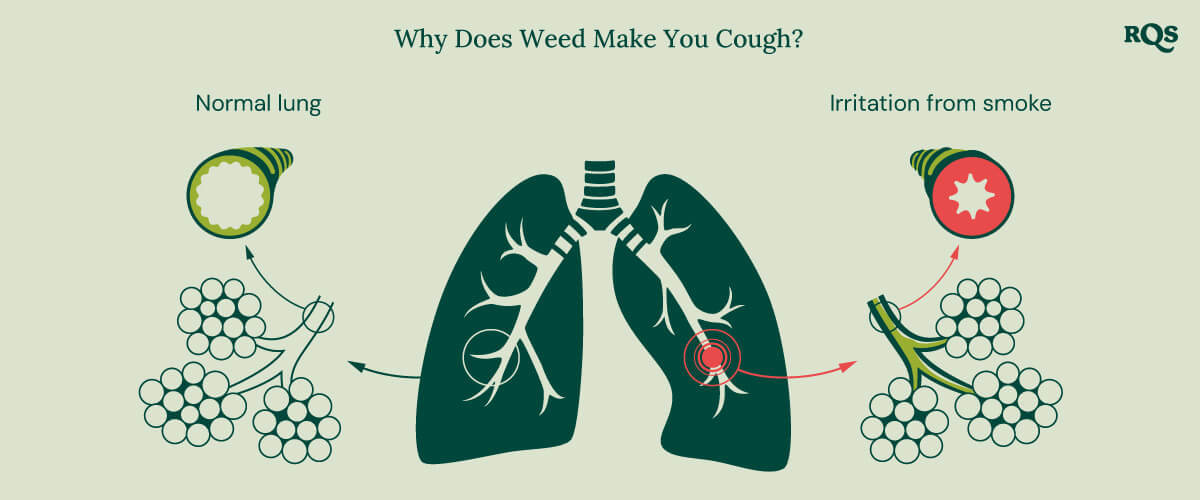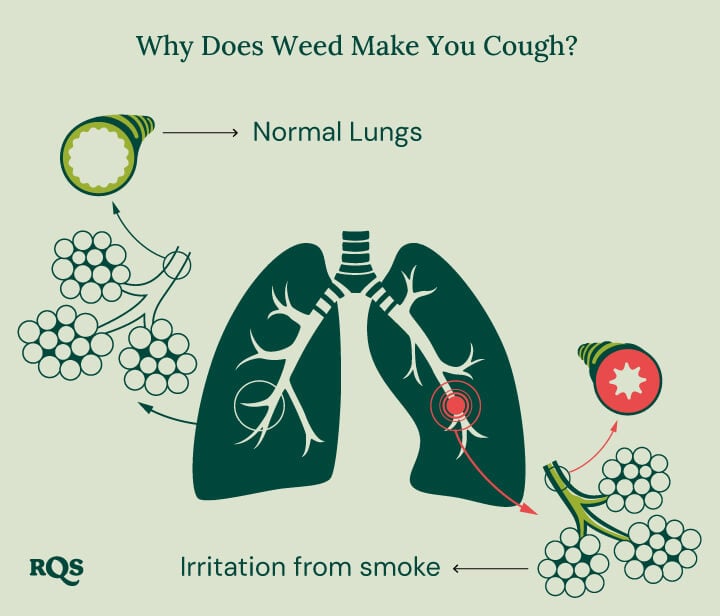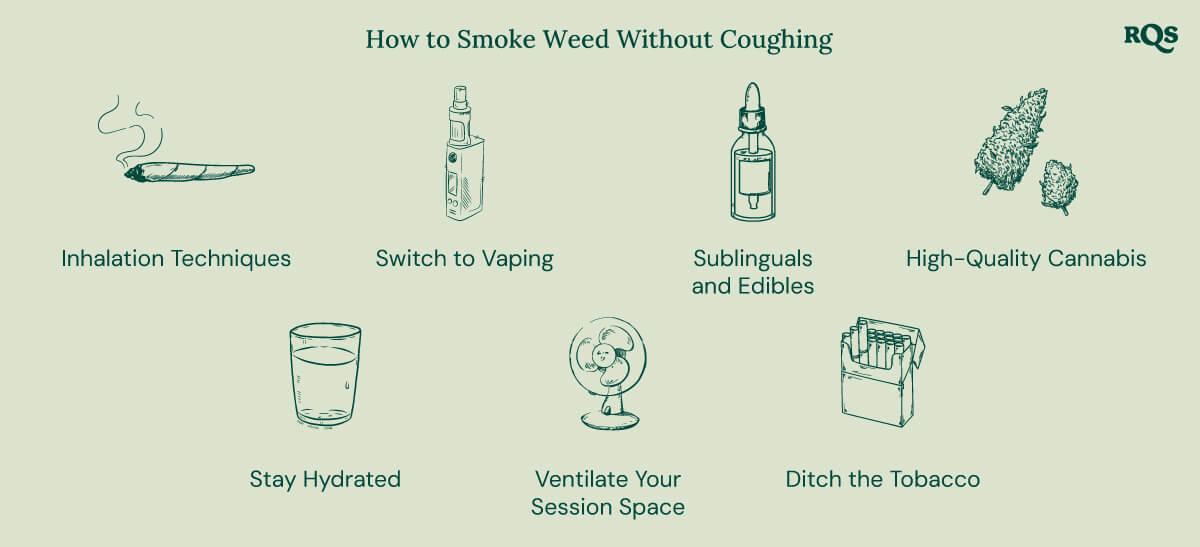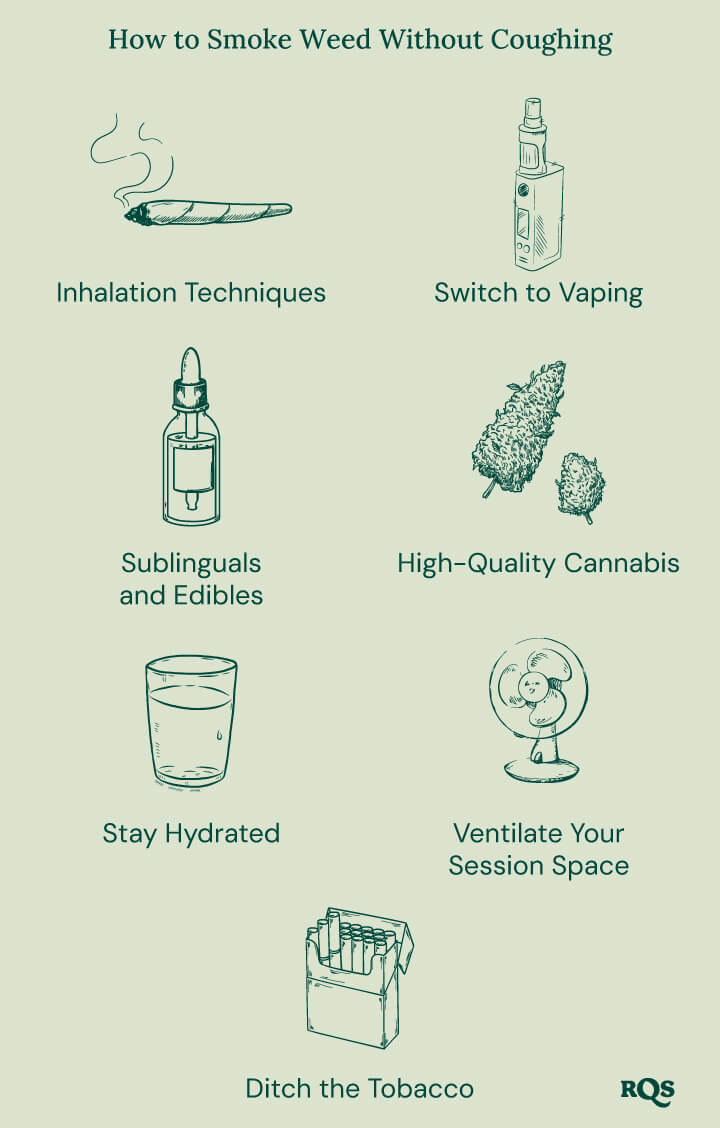.

Why Does Weed Make You Cough and How to Prevent It
Smoking cannabis often results in coughing. Beyond simply inhaling the smoke, the plant also contains phytochemicals such as cannabinoids and terpenes that can irritate the airways. Find out why these coughs are so persistent and how to fix them!
Contents:
Key Points
- Smoking weed can cause both an acute cough and a long-term smoker’s cough.
- Cannabis contains phytochemicals, such as terpenes, that contribute to weed coughing.
- Strain selection can help to reduce the chances of coughing, alongside inhalation techniques and switching from smoking to vaping.
- Explore cough remedies, including tea and honey, cough drops, and humidifiers to soothe symptoms.


Why does weed make you cough? Well, past the obvious cause of inhaling smoke, cannabis contains unique phytochemicals that also play a role in throat and lung irritation. As the bane of many cannabis enthusiasts, users are determined to find ways to stop coughing every time they blaze.
But is it possible to smoke weed without coughing? There are several variables involved, including an individual’s sensitivity to cannabis smoke. However, there are steps you can take to minimise coughing and spluttering when all you want to do is hit a joint in peace.
Continue reading to learn why weed makes you cough and if coughing could even be a good thing, contributing to a more intense cannabis high. Then, we’ll cover multiple strategies to help you stop coughing so much when you smoke. You’ll also learn the difference between an acute cough from smoking weed and a long-term smoker’s cough.
Why Does Weed Make You Cough?
Whether you’re hitting bongs, blunts, or joints, coughing and cannabis often go hand-in-hand. But cannabis smoke isn’t entirely unique in triggering a cough. Smoke from cigarettes, campfires, and any other source can also cause a person to cough. With that said, cannabis contains specific molecules that are also known to aggravate coughing.
-
Irritation From Smoke and Heat
Why does smoking weed make you cough? Well, to begin with, the very act of smoking plays a significant role. Whenever you light the end of a joint and take a hit, you’re essentially inhaling a mix of hot air and combustion byproducts.
These byproducts include over 2,500 chemical compounds, 100 of which are known to be toxic. These noxious substances include ammonia, arsenic, ammonia, formaldehyde, and hydrogen cyanide.
-
Cannabinoids and Terpenes
Smoke certainly plays an important role, but does THC make you cough? Well, weed flowers contain a complex array of cannabinoids, including THC, and many aromatic terpenes. Many of these compounds can trigger the cough reflex.
Different cannabinoids and terpenes can activate TRP channels in the body—cellular sensors that respond to various stimuli. Substances such as THC, CBD, and multiple terpenes can all induce coughing when smoking by directly activating TRP channels or lowering their activation threshold.
-
Individual Sensitivities and Allergies
Have you ever asked yourself, “Why do I cough so much when I smoke weed?”. Well, your individual genetics and biology could also play a role. Some smokers are likely more sensitive to particular cannabinoids and terpenes and smoke in general than others. Despite passing the same joint around a room, some people always end up coughing much more than others.


Does Coughing Make You Higher?
While many cannabis users find coughing a nuisance, others actually aim to cough. Fueled by the idea that coughing enhances their cannabis high, they revel in the moments when cannabis triggers their cough reflex. But does coughing actually make you higher? Find out the answer below.
-
Debunking the Myth
You’ve probably encountered the old stoner wisdom at some point: “If you ain’t chokin’, you ain’t tokin.”. Sorry to burst any bubbles here, but this simply isn’t true.
Coughing doesn’t change the way your lungs absorb THC, nor does it somehow increase the potency of the molecules you’ve just inhaled. Unless you’re blazing with doctors, take any anatomy and physiology lessons you receive around a coffee table with a very large pinch of salt.
With that said, coughing while blazing can certainly make you feel lightheaded, owing to a temporary lack of oxygen. This is probably where this myth originates from.
-
The Science Behind It
When you cough violently, you’re essentially depriving your brain of oxygen for a brief moment. However, it’s long enough to induce a sensation of lightheadedness and dizziness, which some smokers mistake for an intensified high. So, just to clarify, coughing is definitely not getting you higher than normal!
Does Cannabis Cause Smoker’s Cough?
Yes, long-term cannabis smoking can lead to a smoker’s cough, a persistent hack that’s different from the immediate irritation you might feel when toking on a joint or blunt.
A smoker’s cough can occur at any time of the day as the body attempts to clear the airways of mucus and irritants. This condition arises due to damage to the tiny hair-like structures in the lungs, known as cilia.
Does Smoker’s Cough Go Away?
Thankfully, a smoker's cough can improve over time or even disappear entirely. However, you can’t expect to keep blazing in the same way and see it resolve. Your lungs have the ability to heal themselves, but you need to give them the opportunity to rest and repair. The recovery process takes time, and you’ll need to either abstain from cannabis altogether or change the way you consume it to eliminate a smoker's cough.


How to Smoke Weed Without Coughing
If you’re wondering how to smoke weed without coughing or how to alleviate a smoker's cough, you’re in the right place! Next up, we’re going to provide you with some tips to help remedy both types of cough.
-
Proper Inhalation Techniques
You don’t need to polish off half of your joint in a single toke. Take slow, controlled hits instead of deep, forceful drags. Remember, holding in a hit for longer doesn’t get you higher and releasing that hot air faster will take less of a toll on your lungs.
-
Switch to Vaping
Vaping still has a negative impact on the airways but wreaks far less havoc than smoking. Vaporisers avoid combustion and use lower temperatures to vaporise cannabinoids, terpenes, and other target molecules. Ultimately, vaping delivers cooler air and less byproducts. Give it a go if you can’t stop coughing while smoking weed or can’t shift a smoker’s cough.
-
Try Sublinguals and Edibles
If vaping still leaves you hacking, the good news is you don’t have to inhale cannabis to enjoy the plant—sublinguals and edibles are fantastic alternatives.
Sublingual administration involves placing oils or extracts under the tongue, where they rapidly absorb into the bloodstream. Likewise, edibles send cannabinoids through the digestive tract. Just know that the latter takes longer to set in and often produces much more intense effects as a result.
-
Choose High-Quality Cannabis
Not all weed is created equal. If you’re going to smoke or vape, it’ll help to limit your consumption to top-quality weed.
Good-quality weed is free of contaminants such as pesticides and doesn’t contain harsh chemicals. It’s also properly cured, removing excess chlorophyll and other components that can increase the odds of coughing.
-
Stay Hydrated
Sipping water before and during your smoking session will help to soothe your throat and reduce coughing. Keep a glass of water close by or, even better, a warm mug of herbal tea such as ginger or peppermint.
-
Ventilate Your Session Space
Don’t hotbox yourself into a coughing fit. Smoking in a non-ventilated room means you’ll keep recycling the same smoke in your lungs. Run a fan and open a window.
-
Ditch the Tobacco
While many cannabis users enjoy adding tobacco to their spliffs, it only increases the chances of coughing. Ditch the tobacco and the many more harsh chemicals to keep spluttering to a minimum.


Does Indica Make You Cough More Than Sativa?
No. When it comes to coughing and cannabis, indica and sativa genetics aren’t to blame. Rather, focus on the chemical profiles of each strain, including its THC and terpene content. These are the factors that influence coughing.
-
The Role of Strain Types
The terms “indica” and “sativa” simply refer to the morphology of a strain, such as its size and shape. If you’re concerned with weed coughing, you should focus on the chemical traits of each variety. For example, high levels of THC are more likely to induce coughing.
-
Terpene Profiles
Terpenes also play an important role in weed coughing. Pinene, linalool, camphor, and humulene all activate TRP channels. Reputable seedbanks will list the specific terpene profiles of each strain, allowing you to easily experiment and find out which works the best for you.
How to Quickly Treat a Weed Cough
The tips above will help you to prevent a weed cough. Next, we’re going to show you some strategies to stop a weed cough in its tracks and even soothe a smoker’s cough.
- Tea and Honey
- A warm cup of tea with a generous dollop of honey can work wonders to soothe an irritated throat. Honey’s natural properties, combined with the warmth of the tea, almost always help to reduce a weed cough.
- Cough Drops
- Keep some cough drops or lozenges handy, especially during a smoking session. They often provide quick relief and help suppress the urge to cough.
- Salt Water Gargle
- A saltwater gargle is simple and cheap, and it can help to tackle inflammation and irritation. Mix a quarter teaspoon of salt into a glass of warm water, give it a stir, and get gargling.
- Controlled Breathing
- If you feel a cough coming on, try deep, controlled breathing. Breathe in slowly through your nose, hold it for a few seconds and breathe out gently through your mouth.
- Use a Humidifier
- Dry air can exacerbate a coughing fit. A humidifier adds moisture to a room and soothes an irritated throat.
Coughing and Cannabis: Achieve Soothing Smoking Sessions
There you have it—a comprehensive guide to understanding and managing the infamous weed cough! Use the tips above to help prevent and treat coughing fits during your smoking sessions. Likewise, leverage them to help minimise and potentially even eliminate a smoker’s cough. May your hits be smooth and sessions enjoyable!





































